What a consistently weird and unexpected gem Kokkoku is.
 One of the reasons I love seinen so much is that as a rule, it’s much less governed by formula than shounen or shoujo. That familiarity in those demographics can be highly enjoyable, especially when you get a writer who knows how to tweak the template just enough to honor it while still reimagining it. But whether it’s because we’re so conditioned by formulaic series or not, seinen often surprises – it’s much more free to go where it pleases, depending on the inspiration of the writer. That makes the few seinen anime we get something to be treasured, though they don’t all measure up to the level of Kokkoku.
One of the reasons I love seinen so much is that as a rule, it’s much less governed by formula than shounen or shoujo. That familiarity in those demographics can be highly enjoyable, especially when you get a writer who knows how to tweak the template just enough to honor it while still reimagining it. But whether it’s because we’re so conditioned by formulaic series or not, seinen often surprises – it’s much more free to go where it pleases, depending on the inspiration of the writer. That makes the few seinen anime we get something to be treasured, though they don’t all measure up to the level of Kokkoku.
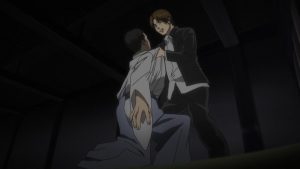 One of those unexpected twists has been to turn much of the focus of the final arc to Sagawa, even making him the central point-of-view character for much of the narrative. He’s got an interesting story – in fact, one of the qualities I admire about this series is that it’s full of people who seem like they could carry a show as a protagonist. After seeing how he got to where he is today – disillusioned by human weakness and betrayed at every turn since childhood – it’s easy to understand how he ended up the way he did. Given what we know of most cult religions (Japan is all too familiar with them) can we really judge a man harshly for dedicating himself to destroying one from the inside?
One of those unexpected twists has been to turn much of the focus of the final arc to Sagawa, even making him the central point-of-view character for much of the narrative. He’s got an interesting story – in fact, one of the qualities I admire about this series is that it’s full of people who seem like they could carry a show as a protagonist. After seeing how he got to where he is today – disillusioned by human weakness and betrayed at every turn since childhood – it’s easy to understand how he ended up the way he did. Given what we know of most cult religions (Japan is all too familiar with them) can we really judge a man harshly for dedicating himself to destroying one from the inside?
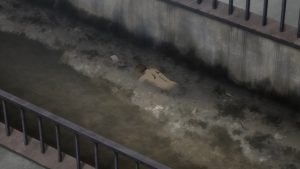 The problem for Juri, of course, is twofold. First, Sagawa represents a practical problem, an existential threat to her family. And second, he’s already done terrible things, things which merit punishment – he’s proved himself beyond a reasonable doubt to be a dangerous and amoral man. I found his rejoinder to Juri quite revealing about his nature – she should take his deal and go back because if not, she and her family would “never be able to experience each other’s pain” again. For Sagawa, that’s all normal life is – pain and annoyance. As such, it’s no sin to deprive other’s of their right to be subjected to it.
The problem for Juri, of course, is twofold. First, Sagawa represents a practical problem, an existential threat to her family. And second, he’s already done terrible things, things which merit punishment – he’s proved himself beyond a reasonable doubt to be a dangerous and amoral man. I found his rejoinder to Juri quite revealing about his nature – she should take his deal and go back because if not, she and her family would “never be able to experience each other’s pain” again. For Sagawa, that’s all normal life is – pain and annoyance. As such, it’s no sin to deprive other’s of their right to be subjected to it.
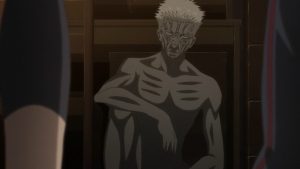 When push comes to shove, Juri decides to do what she has to do – though Ojii-san tries to stop her to “keep her hands clean”. But he hesitates – that’s certain, though it’s less certain whether Juri does too. Takafumi’s intervention makes it moot I suppose, and it again reveals both his flaws as a person and his genuine desire to protect his family. He’s broken, this man, but he still loves his family and they him – and that’s important in understanding this story and its characters, I think. But in Takafumi-vision, he certainly did “nail it”.
When push comes to shove, Juri decides to do what she has to do – though Ojii-san tries to stop her to “keep her hands clean”. But he hesitates – that’s certain, though it’s less certain whether Juri does too. Takafumi’s intervention makes it moot I suppose, and it again reveals both his flaws as a person and his genuine desire to protect his family. He’s broken, this man, but he still loves his family and they him – and that’s important in understanding this story and its characters, I think. But in Takafumi-vision, he certainly did “nail it”.
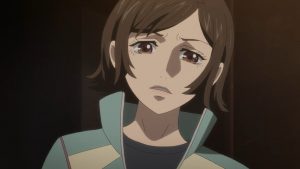 Sagawa is desperate and resourceful in clinging to life, however (considering how little he values it for others), and has one more trick up his sleeve. He escapes with his brain and vitals and forms a cocoon around himself, sending out razor-sharp threads which both protect him and draw in materials from the air around him. This is a tense, interesting cat and mouse – and it leaves the good guys more or less in stasis (figuratively, this time) as they wait Sagawa out. This is a time for Juri and Ojii-san to reflect on their choices, and there future – especially for Juri, who has to send her father back out of stasis without the chance to say goodbye.
Sagawa is desperate and resourceful in clinging to life, however (considering how little he values it for others), and has one more trick up his sleeve. He escapes with his brain and vitals and forms a cocoon around himself, sending out razor-sharp threads which both protect him and draw in materials from the air around him. This is a tense, interesting cat and mouse – and it leaves the good guys more or less in stasis (figuratively, this time) as they wait Sagawa out. This is a time for Juri and Ojii-san to reflect on their choices, and there future – especially for Juri, who has to send her father back out of stasis without the chance to say goodbye.
 That Grandpa would decide to stay makes perfect sense – he disapproves of Juri’s sacrifice on his behalf, so (despite her efforts) he’s not going to let her suffer alone (at least for a while – he is much older than she). But there are still other goodbyes to be made – most poignantly Makoto, who represents hope for the Yuzawa family’s future. But Sagawa forces the issue one last time, and takes the story in yet another unexpected direction. In doing so he imposes on Juri and Grandpa an age-old moral dilemma, one often expressed through “What if you had the chance to kill (fill in the blank evil figure) as a baby – would you do it?” It’s certainly an interesting setup for what should be a fascinating final episode.
That Grandpa would decide to stay makes perfect sense – he disapproves of Juri’s sacrifice on his behalf, so (despite her efforts) he’s not going to let her suffer alone (at least for a while – he is much older than she). But there are still other goodbyes to be made – most poignantly Makoto, who represents hope for the Yuzawa family’s future. But Sagawa forces the issue one last time, and takes the story in yet another unexpected direction. In doing so he imposes on Juri and Grandpa an age-old moral dilemma, one often expressed through “What if you had the chance to kill (fill in the blank evil figure) as a baby – would you do it?” It’s certainly an interesting setup for what should be a fascinating final episode.




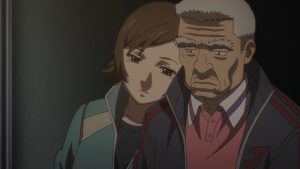
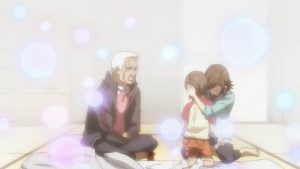
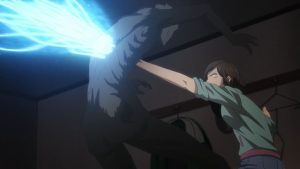

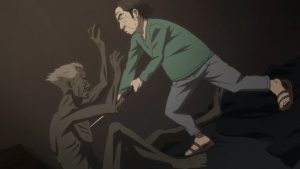
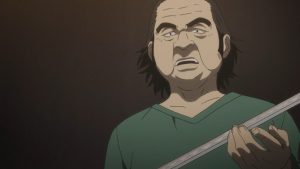


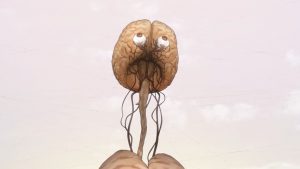



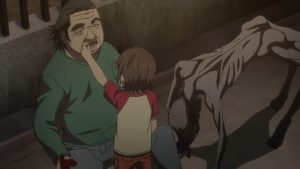
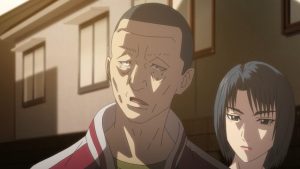

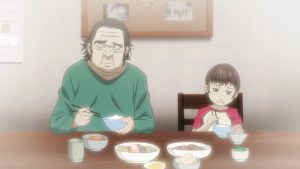

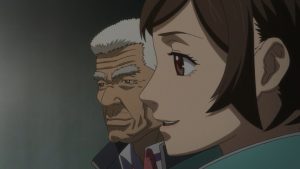

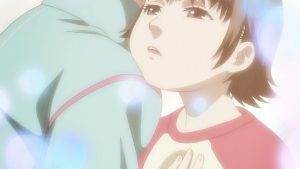
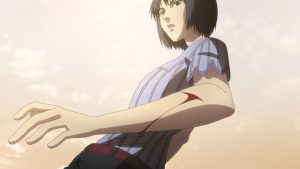
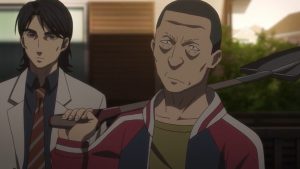
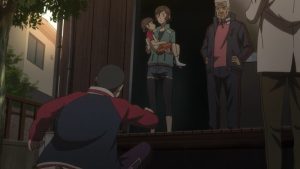
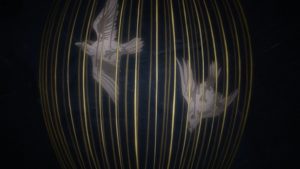

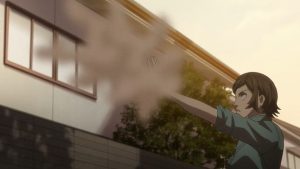
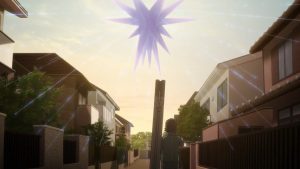

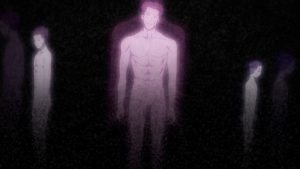


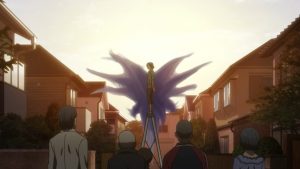
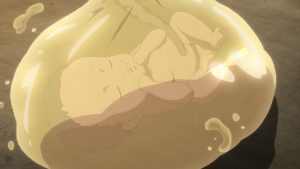
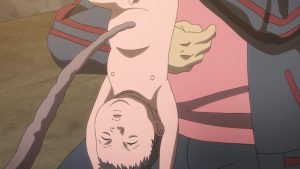
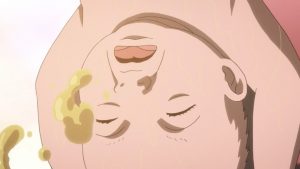

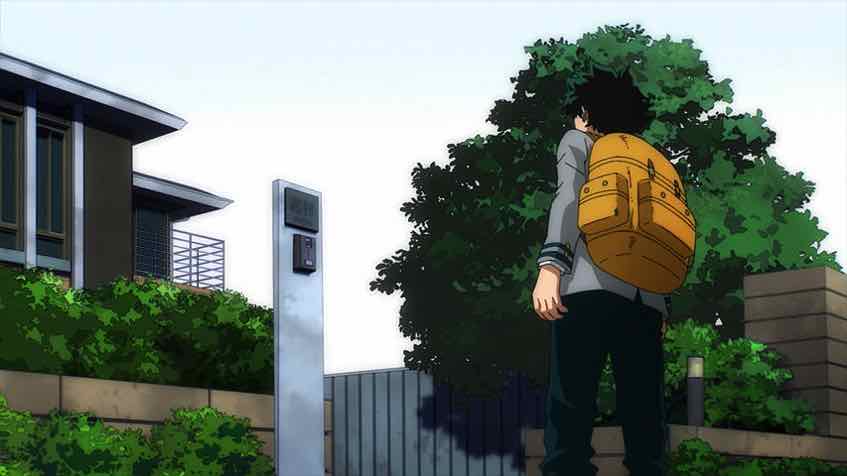
justfun
March 20, 2018 at 4:44 amI’m curious how the show will deal with the baby. Giving an antagonist a second chance in life by being reborn and making better experiences seems pretty clichéd for anime, but with the show toying with our expectations – who knows.
ssva
March 20, 2018 at 5:31 amHuh. Well. Alright then. I don’t quite buy Sagawa’s story or potential redemption arc, but for someone who feels betrayed in life he’s got one nasty will to live. The episode was a bit of a let down for me – the pacing was too quick, Sagawa’s story didn’t quite click, and the animation quality kind of dropped. But Juri’s family moments were still very poignant.
I’ll still praise Kokkoku top spot for unpredictability – not that it didn’t have cliches or plot holes, it’s just that I keep getting surprised in almost every episode. I do wonder why some people think this series is boring – maybe because it’s slow building and doesn’t have a ton of action? Is it the old-ish anime look? I’m confused.
(does anyone think sagawa’s brain with the googly eyes is just kind of funny looking? is it just me? oh fine it’s just me)
Michael
March 20, 2018 at 6:34 amWhat a fascinating show! I wonder if the show is flipping the protagonists and antagonists here.
I am just not convinced that Sagawa, in the state he was in the beginning of the episode, was any threat to Juri or her family. It just doesn’t make any sense. She could expel her family from stasis right in the beginning of the episode with no consequences and Sagawa just plain wouldn’t care. After they decide to kill Sagawa (or Takufumi forces the issue rather), Sagawa holes up in a cocoon. Besides the razor wires, that he is sending out to protect himself and draw energy in from the air, he is again no direct threat to Juri or her family. Juri then expels him from the cocoon, leading to the group debating on whether to let the baby die or not, and that’s when Oji-san jumps in. I doubt he approves of going so far to kill this baby, especially as it might represent the only way for him and Juri to get home.
But this ideology that a stronger being must kill utterly and completely a weaker being, who while harboring ill-intent does not appear to want to act on it, is quite questionable morally. With stasis, the threat this version of Sagawa harbors towards Juri’s family is almost nil. I just have trouble approving of Juri’s actions.
The last episode will be fascinating and I think Grandpa and Juri will have some strong debates over what to do next.
Stöt
March 20, 2018 at 7:14 amWith Stasis the chance isn’t “almost nil”, it’s 0 or 1. That kid will grow up while everybody else’s time stands still and then kill anyone, or it might not. Right? I don’t understand your reasoning.